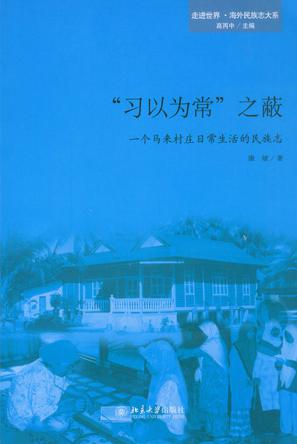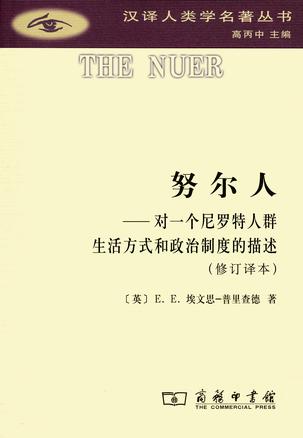-

“习以为常”之蔽
康敏博士的专著《“习以为常”之蔽》是一部很值得一读的外国民族志,很了不起。该书反映了近年来中国东南亚研究中一个非常可喜的重要转向:即中国大学的博士生开始走出国门,奔赴东南亚国家从事田野调查研究。在此之前,虽然不乏海外中国留学生也到东南亚实地调查,收集资料,但一般都是受国外大学的派遣与资助,专门为国外大学学位论文而准备;同样,虽然中国大学也有部分学者、甚至博士生,曾创造条件到东南亚国家进行这样或那样的研究,但一般或为短期肤浅粗放式的观光考察,或为长期交流学习式的进修访问;虽然中国前辈著名学者如人类学家林惠祥和社会学家陈达,也曾在东南亚从事过长期的实地考察,并有专门著作问世,但那毕竟是在战前特殊的历史条件下进行的,就像台湾著名的人类学家李亦园上个世纪六十年代赴马来西亚柔佛州的田野考察一样,毕竟与内地大学和学者的境况不可同日而语。就社会科学在新中国半个多世纪来的独特历史遭遇和中国对外国地域研究的整体水平而言,像康敏博士那样从事为期近一年的专题田野调查,从学术的原动力到财物资助,完全靠自己筹措而不用依靠海外援助,其困难之大,可想而知;其闯劲之足,令人刮目。正因为如此,如果说北大社会学与人类学系高丙中教授麾下的博士生团队可谓开了风气之先,一点不为过。康敏博士论文的成功实践,从另一个侧面也展示了中国与东南亚关系(包括学术交流)近士多年来突飞猛进的飞跃发展和广阔前景。 -

家与中国社会结构
-

努尔人
《努尔人》一书通过对非洲部落政治制度的田野研究,提出了一个挑战性的问题:在一个没有国家和政府统治的群体中,社会是如何组织起来的? 本书是现代人类学史上最著名、最具有代表性的典范作品之一。《努尔人》的经典性一方面体现在其主题上,它开创了一部民族志专门讨论个主题的先河;另一方面体现在其方法论上,它集中在一个具体的社会里展开结构分析。这两方面均对今后人类的研究范式产生了深远的影响。 -

羌村社会
本书试图通过羌村这一典型社区的调查研究,探索人类社会构成的基本原理和文化变迁的一般规律。书中详细描述分析了羌村人的经济生活模式,社会构建与运转,个人与社会的关系,精神世界的构造;进而联系羌族历史上从游牧到农耕的巨大变迁,以及羌村现实生活的变化,提出文化的本质在于适应,适应带来社会进步的理论假设。在文化更新和文化融合都更为剧烈的今天,如何更好的适应急剧变化的世界?羌村人的故事,或许对我们有所启迪。 -

Plough, Sword, and Book
From Publishers Weekly Dividing world history into three phases (hunting/gathering, agriculture and industry), this study asserts that most agrarian civilizations are too self-limiting for the leap into capitalism and a market economy. "Gellner's ambitious theory smacks of Eurocentric hubris, and . . . his prose is turgid and portentous," chided PW. Copyright 1990 Reed Business Information, Inc. From Library Journal British philosopher/anthropologist Gellner offers a comprehensive theory of history: humans settle into agriculture, produce surpluses, and divide into complex subgroups. Communication becomes pressing. Written language emerges as a controlling super-reality, bringing a Platonic illusion of an eternal world. Gradually, facts take precedence over concepts and "objective knowledge" is born. This scheme takes us from the tribal society to the Royal Society, but Gellner has not met all the challenges. There are still those who think that real knowledge is offered only by theology, or Platonic mathematical and logical reality, or a society free of class tension. And Franz Borkenau urged in End and Beginning ( LJ 1/11/81) that all knowable reality is powerfully shaped by language. Thought-provoking but not conclusive. - Leslie Armour, Univ. of Ottawa Copyright 1989 Reed Business Information, Inc. --This text refers to an out of print or unavailable edition of this title. -

Anthropology and Social Theory
In "Anthropology and Social Theory", the award-winning anthropologist Sherry B. Ortner draws on her longstanding interest in theories of cultural practice to rethink key concepts of culture, agency, and subjectivity for the social sciences of the twenty-first century. The seven theoretical and interpretive essays in this volume each advocate reconfiguring, rather than abandoning, the concept of culture. Similarly, they all suggest that a theory which depends on the interested action of social beings - specifically practice theory, associated especially with the work of Pierre Bourdieu - requires a more developed notion of human agency and a richer conception of human subjectivity. Ortner shows how social theory must both build upon and move beyond classic practice theory in order to understand the contemporary world. Some of the essays reflect explicitly on theoretical concerns: the relationship between agency and power, the possibility of producing an anthropology of subjectivity, and the problematic quality of ethnographic studies of resistance. Others are ethnographic studies that put into practice Ortner's theoretical framework. In these, she investigates aspects of social class, looking at the relationship between race and middle-class identity in the United States, the often invisible nature of class as a cultural identity and as an analytical category in social inquiry, and the role that public culture and media played in the creation of the class anxieties of Generation X. Written with Ortner's characteristic lucidity, these essays constitute a major statement about the future of social theory from one of the leading anthropologists of our time.